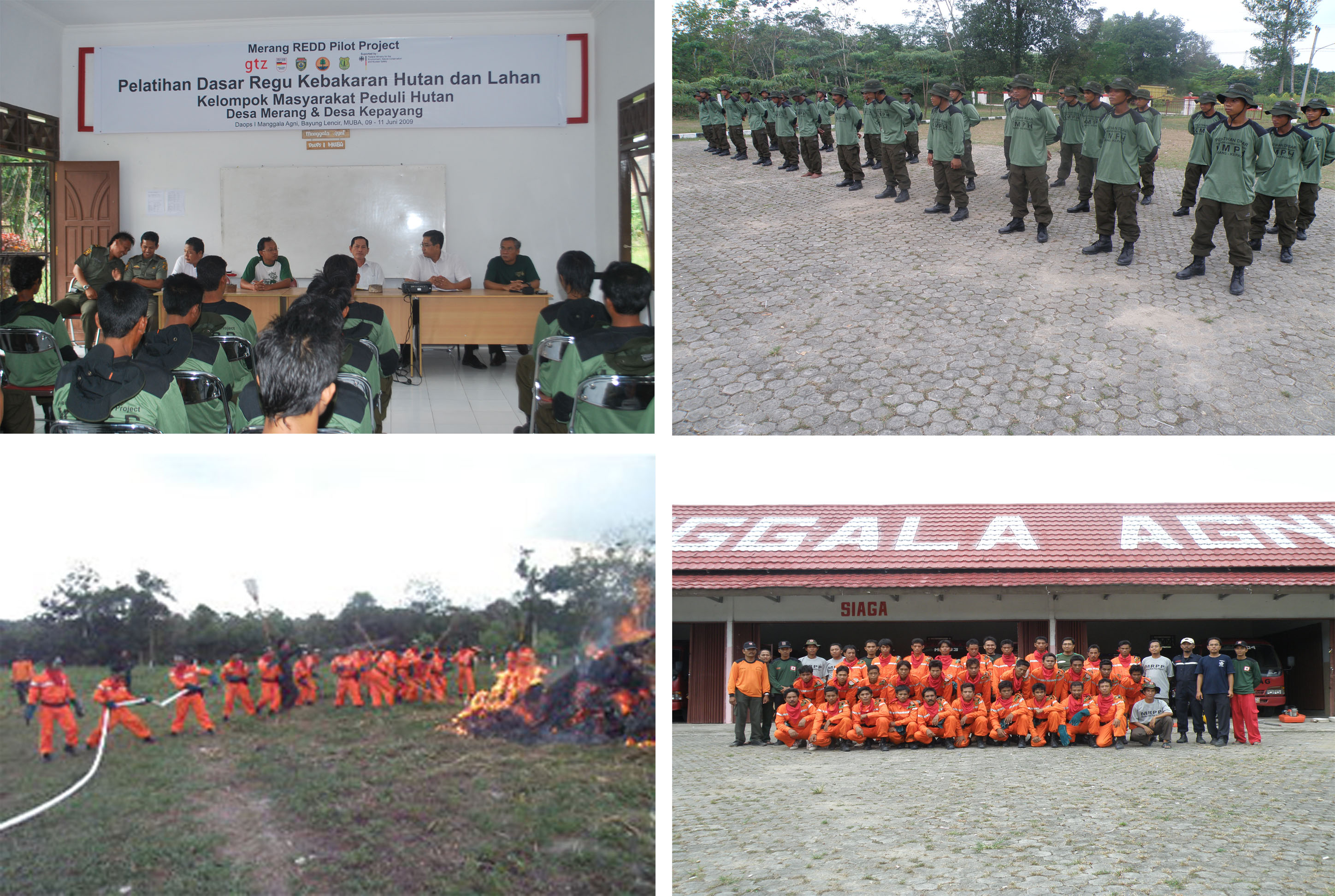| Integrated Community Development for Forest Protection |
|
Background Climate change Climate change due to green house gas emission (GHE) has potential to increase the average global temperature at 2.8°C from 2000 to 2100 (UNEP/GRID ARENDAL, 2005 in PEACE 2007). For Indonesia as an agricultural country, the major adverse impact of climate change is the occurrence of disturbances on the hydrologic cycle in the form of changes in rainfall pattern and intensity, sea level rise, rising frequency and intensity of disasters which could cause water crises and drought, decrease of agriculture production and fishery, and changes of biological diversity. MRPP and Merang Kepayang peat swamp Forest The 2007 Bali conference of parties to the United Nations Framework Convention on Climate Change called for the establishment of a mechanism for compensating the reduction in emissions from tropical deforestation and forest degradation in developing countries. It was also decided that a series of pilot projects / demonstration activities should provide the experience necessary to successfully implement such a mechanism. In South Sumatra, the Merang Kepayang Peat Swamp Forest area is MRPP project location for such a pilot project due to the still relatively intact forest cover and the large below ground carbon storage in the peat, as well as the suitable location with connections to the protected areas of Sembilang National Park in South Sumatra, and Berbak National Park in Jambi. The German Federal Ministry of Environment, Nature Conservation and Nuclear Safety (BMU) accepted the proposal and committed to finance the MRPP project as a grant scheme up to 1,433,454 Euro, for the project period of 2008-2011. The executing agency is the Ministry of Forestry of Indonesia and the assigned implementing agencies to conduct the project is the District Forestry agency Musi Banyuasin and Province Forest agency South Sumatra in cooperation with the Deutsche Gesellschaft fuer Technische Zusammenarbeit (GTZ) GmbH Indonesia. Project area allocated by Bupat/Head of Musi Banyuasin District for MRPP is covering an area of 24,000 Ha of the Merang Kepayang Peat Swamp Production Forest, administratively under the Bayung Lencir Sub District, Musi Banyuasin (MUBA) District. Additional data base collection conducted by project:
Community Forest Rangers or “Kelompok Masyarakat Peduli Hutan” (KMPH) To conserve, protect and rehabilitate the Merang Kepayang peat swamp forest, MRPP being developed an approach and strategy of promoting sustainable natural resource management that includes active community participation. The community participation expected particularly in the fields of forest protection (from illegal logging and fire threats), conservation and rehabilitation through the establishment of Community Forest Rangers or “Kelompok Masyarakat Peduli Hutan” abbreviated as “KMPH”. Up to July 2009, it has been established 2 (two) unit of KMPH with 15 members each, namely KMPH “Tembesu” of Bina Desa hamlet, and KMPH “Petaling” of Kepayang village. With this approach/strategy project try to promote and facilitate the community active participation on almost every aspect of project activities of sustainable forest management in the area. They should become key actor and play important roles in forest conservation, rehabilitation and protection including prevention and initial control of fire.
To strengthen its capacity and competency, interventions from project as well as from related stakeholders are essential. Substantial trainings and interventions should be made, such as on further raising public awareness, facilitation and provision of alternatives income generating activities as part of incentives, various training on forestry techniques as well as on appropriate agricultural technologies and strengthening group institutional capacities. Those above mentioned trainings and interventions been and to be provided, are part of capacity and competency development required for community active participation intended. Precondition, village meetings and workshops:
Thematic trainings for KMPH:
Monthly/Regular KMPH Facilitation on institutional strengthening and IGA monitoring conducted in collaboration with NGO Yayasan Kemasda starting from June, 2009 KMPH’s activities conducted up to July 2009 are as follows:
Income generating activities (IGA) Income generating activities being provided is intended as a field example of appropriate alternative income generating activities, hopefully can be up scaled/replicated by other villager, to reduce illegal logging activities beside as an incentive for active members who voluntarily joint the KMPH. The process of IGA selection and its implementation described as follows:
After long discussions, finally the two KMPH proposing poultry as participatory agreed income generating activities for each member of KMPH. KMPH “Tembesu” of Bina Desa hamlet was chose local breed hens and KMPH “Petaling” of Kepayang village chose broiler chicken to be reared. Poultry rearing establishment will be facilitated by project in collaboration with experts from Agricultural Technology Assessment Agency (Balai Pengkajian Technology Pertanian) Palembang and Agriculture, Fishery and Forestry Extension Agency (Badan Penyuluh Pertanian, Perikanan dan Kehutanan) Bayung Lencir sub-district. This collaboration strongly needed as part of strategy for the sustainability and as an exit strategy for post project further facilitation to the KMPH’s IGA activities. The IGA activities will consists of initial capital provision by project, poultry rearing technology including local comparative studies, regular facilitation and internship to the established poultry companies where required. To increase sense of belonging of the groups, each member of KMPH should provide contribution in form of hens cages and labor force for daily rearing activities.
|
|
|



